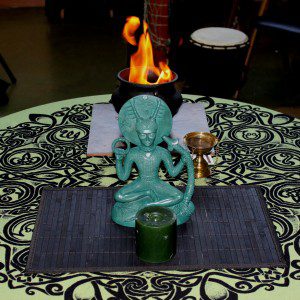 So, how did you celebrate Imbolc? Did you go to a big public ritual? Gather in your living room with a few friends and family? A quiet reflection on your own? I hope your Imbolc was warm and bright however you celebrated.
So, how did you celebrate Imbolc? Did you go to a big public ritual? Gather in your living room with a few friends and family? A quiet reflection on your own? I hope your Imbolc was warm and bright however you celebrated.
And I do hope you celebrated Imbolc. While Jason Mankey is right that we don’t know all that much about it, we do know Imbolc was one of the primary festivals of our Celtic ancestors and it’s one of the eight major holidays on the modern Pagan calendar. Presenting and performing rituals on these special days connects us to our ancestors and reminds us to mark the changing seasons. Plus they’re great excuses to get together and celebrate being Pagan. In a culture that’s sometimes Christian, sometimes secular, and rarely Pagan, that’s an important thing to do.
If you’ve been reading this blog a while you know how much I love ritual. I especially love big public rituals. A big group can present a big story – it can tell a myth visually and emotionally and not just verbally. A big crowd can raise a lot of energy with singing, chanting, and dancing. A big public ritual has room for all kinds of people, including those who may be uncomfortable with a more intimate gathering.
But a steady diet of big rituals and public rituals can have a draining effect on those who plan and present them. For one thing, they’re a lot of work. There’s the conception, brainstorming, and writing. There’s planning, editing, and refining. There’s gathering all the stuff you need, setting it up, and making sure everything is in the right place. There’s rehearsal, walk-through, and last-minute adjustments – all the things it takes to present a memorable ritual worthy of our Gods and ancestors.
You do do all these things before your big public rituals, right? You don’t try to wing it, right? Right?
When you’re constantly planning and presenting, you’re so busy facilitating experiences for others it’s hard to have a real religious experience yourself. That’s one of the sacrifices Pagan leaders make. It’s a necessary sacrifice and I make it freely and gladly.
But it doesn’t fill the need for our own real religious experiences.
Some of our needs can be met through daily spiritual practice. Through prayer, we can speak to the Gods every day. Through meditation, we can listen for the Gods every day. Through offerings, we can honor Them and strengthen our connections with Them every day. Even if you never pour the first libation or call the first quarter in a public ritual, regular spiritual practice is a necessary part of any religious tradition.
Some personal needs can be met through preparatory rituals. Invoking a deity (in any sense of the term) is not something you want to do for the first time in a public ritual. The best large rituals I’ve led have been preceded by private rituals by and for the priests involved. These tend to be simple and brief, usually focused on hospitality and on listening.
“Greetings. Please join our gathering. Have some wine. How do You want us to present You to an audience who knows You only as a character in an old story? What do You want us to emphasize, and what – if anything – do You want us to ignore? Thank You for Your presence and Your blessings.”
Our Egyptian Summer Solstice rituals are an exception to this simple approach. Here we performed the evening portion of the Daily Temple Ritual in a private setting. Of course, when you’re dealing with the Gods of Egypt, you’ve got a tradition to draw on that was quite literally carved in stone. We don’t have to recreate rites so much as adapt them to our time and place.
But sometimes we need private rituals. Sometimes we need just a few people who know and trust each other to get together with a very basic liturgy and open yourselves to the Gods, ancestors, and spirits of Nature. We need to salute the sun, howl at the moon, or dance around the trees. We need a living room with the curtains closed or a fenced back yard or a private campground in the middle of nowhere. We need some place where we can do what we’re called to do and be open to the response, whatever it may be.
We need a situation where we feel safe to be vulnerable.
These intense private rituals don’t scale up well – I understand why Wiccan covens are capped at 13. They require a level of trust that’s hard to come by in groups that know and like each other and that’s impossible to achieve in a public setting. And just as public rituals are no substitute for the spiritual depth of small private rituals, neither are private rituals a satisfactory substitute for the breadth and power of big public rituals.
Our community needs both. We need both.
I need both.
So I hope you had a nice Imbolc – I certainly did. But I also hope that in the weeks between now and the Spring Equinox you and your closest co-religionists will spend some time in deep devotion to the Gods, ancestors, and spirits of your tradition and those that call to you.













